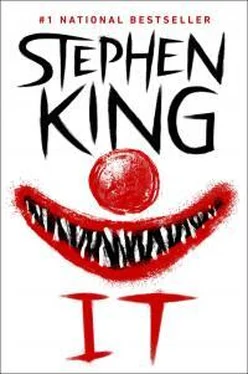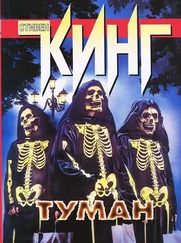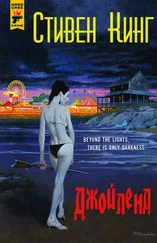“Oh, shit! I’m sorry.”
“It’s all right. Stanley—what were you talking about?”
“I forget,” he said. “But I think we ought to think Georgia, babylove.”
“But—”
“Trust me,” he said, so she did.
Her interview had gone smashingly. She had known she had the job when she got on the train back to New York. The head of the Business Department had taken an instant liking to Patty, and she to him; she had almost heard the click. The confirming letter had come a week later. The Traynor Consolidated School Department could offer her $9,200 and a probationary contract.
“You are going to starve,” Herbert Blum said when his daughter told him she intended to take the job. “And you will be hot while you starve.”
“Fiddle-dee-dee, Scarlett,” Stanley said when she told him what her father had said. She had been furious, near tears, but now she began to giggle, and Stanley swept her into his arms.
Hot they had been; starved they had not. They were married on August 19th, 1972. Patty Uris had gone to her marriage bed a virgin. She had slipped naked between cool sheets at a resort hotel in the Poconos, her mood turbulent and stormy—lightning-flares of wanting and delicious lust, dark clouds of fright. When Stanley slid into bed beside her, ropy with muscle, his penis an exclamation point rising from gingery pubic hair, she had whispered: “Don’t hurt me, dear.”
“I will never hurt you,” he said as he took her in his arms, and it was a promise he had kept faithfully until May 28th, 1985—the night of the bath.
Her teaching had gone well. Stanley got a job driving a bakery truck for one hundred dollars a week. In November of that year, when the Traynor Flats Shopping Center opened, he got a job with the H & R Block office out there for a hundred and fifty. Their combined income was then $17,000 a year—this seemed a king’s ransom to them, in those days when gas sold for thirty-five cents a gallon and a loaf of white bread could be had for a nickel less than that. In March of 1973, with no fuss and no fanfare, Patty Uris had thrown away her birth-control pills.
In 1975 Stanley quit H & R Block and opened his own business. All four in-laws agreed that this was a foolhardy move. Not that Stanley should not have his own business—God forbid he should not have his own business! But it was too early, all of them agreed, and it put too much of the financial burden on Patty. (“At least until the pisher knocks her up,” Herbert Blum told his brother morosely after a night of drinking in the kitchen, “and then I’ll be expected to carry them.”) The consensus of in-law opinion on the matter was that a man should not even think about going into business for himself until he had reached a more serene and mature age—seventy-eight, say.
Again, Stanley seemed almost preternaturally confident. He was young, personable, bright, apt. He had made contacts working for Block. All of these things were givens. But he could not have known that Corridor Video, a pioneer in the nascent videotape business, was about to settle on a huge patch of farmed-out land less than ten miles from the suburb to which the Urises had eventually moved in 1979, nor could he have known that Corridor would be in the market for an independent marketing survey less than a year after its move to Traynor. Even if Stan had been privy to some of this information, he surely could not have believed they would give the job to a young, bespectacled Jew who also happened to be a damyankee—a Jew with an easy grin, a hipshot way of walking, a taste for bell-bottomed jeans on his days off, and the last ghosts of his adolescent acne still on his face. Yet they had. They had. And it seemed that Stan had known it all along.
His work for CV led to an offer of a full-time position with the company—starting salary, $30,000 a year.
“And that really is only the start,” Stanley told Patty in bed that night. “They are going to grow like corn in August, my dear. If no one blows up the world in the next ten years or so, they are going to be right up there on the big board along with Kodak and Sony and RCA.”
“So what are you going to do?” she asked, already knowing.
“I am going to tell them what a pleasure it was to do business with them,” he said, and laughed, and drew her close, and kissed her. Moments later he mounted her, and there were climaxes—one, two, and three, like bright rockets going off in a night sky . . . but there was no baby.
His work with Corridor Video had brought him into contact with some of Atlanta’s richest and most powerful men—and they were both astonished to find that these men were mostly okay. In them they found a degree of acceptance and broad-minded kindliness that was almost unknown in the North. Patty remembered Stanley once writing home to his mother and father: The best rich men in America live in Atlanta, Georgia. I am going to help make some of them richer, and they are going to make me richer, and no one is going to own me except my wife, Patricia, and since I already own her, I guess that is safe enough.
By the time they moved from Traynor, Stanley was incorporated and employed six people. In 1983 their income had entered unknown territory—territory of which Patty had heard only the dimmest rumors. This was the fabled land of SIX FIGURES. And it had all happened with the casual ease of slipping into a pair of sneakers on Saturday morning. This sometimes frightened her. Once she had made an uneasy joke about deals with the devil. Stanley had laughed until he almost choked, but to her it hadn’t seemed that funny, and she supposed it never would.
The turtle couldn’t help us.
Sometimes, for no reason at all, she would wake up with this thought in her mind like the last fragment of an otherwise forgotten dream, and she would turn to Stanley, needing to touch him, needing to make sure he was still there.
It was a good life—there was no wild drinking, no outside sex, no drugs, no boredom, no bitter arguments about what to do next. There was only a single cloud. It was her mother who first mentioned the presence of this cloud. That her mother would be the one to finally do so seemed, in retrospect, preordained. It finally came out as a question in one of Ruth Blum’s letters. She wrote Patty once a week, and that particular letter had arrived in the early fall of 1979. It came forwarded from the old Traynor address and Patty read it in a living room filled with cardboard liquor-store cartons from which spilled their possessions, looking forlorn and uprooted and dispossessed.
In most ways it was the usual Ruth Blum Letter from Home: four closely written blue pages, each one headed JUST A NOTE FROM RUTH. Her scrawl was nearly illegible, and Stanley had once complained he could not read a single word his mother-in-law wrote. “Why would you want to?” Patty had responded.
This one was full of Mom’s usual brand of news; for Ruth Blum recollection was a broad delta, spreading out from the moving point of the now in an ever-widening fan of interlocking relationships. Many of the people of whom her mother wrote were beginning to fade in Patty’s memory like photographs in an old album, but to Ruth all of them remained fresh. Her concerns for their health and her curiosity about their various doings never seemed to wane, and her prognoses were unfailingly dire. Her father was still having too many stomach-aches. He was sure it was just dyspepsia; the idea that he might have an ulcer, she wrote, would not cross his mind until he actually began coughing up blood and probably not even then. You know your father, dear—he works like a mule, and he also thinks like one sometimes, God should forgive me for saying so. Randi Harlengen had gotten her tubes tied, they took cysts as big as golfballs out of her ovaries, no malignancy, thank God, but twenty-seven ovarian cysts, could you die? It was the water in New York City, she was quite sure of that—the city air was dirty, too, but she was convinced it was the water that really got to you after awhile. It built up deposits inside a person. She doubted if Patty knew how often she had thanked God that “you kids” were out in the country, where both air and water—but particularly the water—were healthier (to Ruth all of the South, including Atlanta and Birmingham, was the country). Aunt Margaret was feuding with the power company again. Stella Flanagan had gotten married again, some people never learned. Richie Huber had been fired again.
Читать дальше








